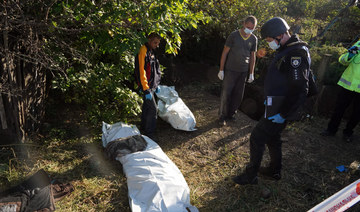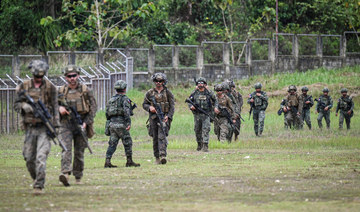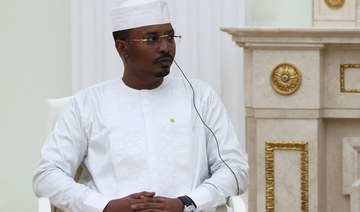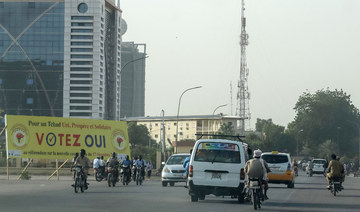KYIV: Ukrainian troops on Sunday successfully pressed their swift counteroffensive in the northeastern part of the country, even as a nuclear power plant in the Russia-occupied south completely shut down in a bid to prevent a radiation disaster as fighting raged nearby.
But Russia struck back at Ukraine’s infrastructure Sunday night, causing widespread blackouts, with the Kharkiv and Donetsk regions among those without power, officials said.
Kyiv’s action to reclaim Russia-occupied areas in the Kharkiv region forced Moscow to withdraw its troops to prevent them from being surrounded, leaving behind significant numbers of weapons and munitions in a hasty retreat as the war marked its 200th day on Sunday.
Ukrainian President Volodymyr Zelensky mocked the Russians in a video address Saturday night, saying “the Russian army in these days is demonstrating the best that it can do — showing its back.”
He posted a video of Ukrainian soldiers hoisting the national flag over Chkalovske, another town reclaimed in the counteroffensive.
Yuriy Kochevenko, of the 95th brigade of the Armed Forces of Ukraine, tweeted a video from what appeared to be the city center of Izyum. The city was considered an important command and supply hub for Russia’s northern front.
“Everything around is destroyed, but we will restore everything. Izyum was, is, and will be Ukraine,” Kochevenko said in his video, showing the empty central square and destroyed buildings.
While most attention focused on the counteroffensive, Ukraine’s nuclear energy operator said the Zaporizhzhia nuclear power plant, Europe’s largest, was reconnected to Ukraine’s electricity grid, allowing engineers to shut down its last operational reactor to safeguard it amid the fighting.
The plant, one of the 10 biggest atomic power stations in the world, has been occupied by Russian forces since the early days of the war. Ukraine and Russia have traded blame for shelling around it.
Since a Sept. 5 fire caused by shelling knocked the plant off transmission lines, the reactor was powering crucial safety equipment in so-called “island mode” — an unreliable regime that left the plant increasingly vulnerable to a potential nuclear accident.
The International Atomic Energy Agency, the UN nuclear watchdog that has two experts at the site, welcomed the restoration of external power. But IAEA Director-General Rafael Grossi said he is “gravely concerned about the situation at the plant, which remains in danger as long as any shelling continues.”
He said talks have begun on establishing a safety and security zone around it.
In a call Sunday with Russian President Vladimir Putin, French President Emmanuel Macron urged the withdrawal of Russian troops and weaponry from the plant in line with IAEA recommendations.
In fighting, Ukraine’s military chief, Gen. Valerii Zaluzhnyy, said its forces had recaptured about 3,000 square kilometers (1,160 square miles) since the counteroffensive began in early September. He said Ukrainian troops are only 50 kilometers (about 30 miles) from the Russian border.
One battalion shared a video of Ukrainian forces in front of a municipal building in Hoptivka, a village just over a mile from the border and about 19 kilometers (12 miles) north of Kharkiv.
Kharkiv Gov. Oleh Syniehubov said Ukrainian troops have reclaimed control of more than 40 settlements in the region.
Widespread power outages were reported Sunday night by Ukrainian media, with the Kharkiv and Donetsk regions completely blacked out, while Dnipropetrovsk, Zaporizhzhia and Sumy partially lost power, Zelensky said.
“Russian terrorists remain terrorists and attack critical infrastructure. No military facilities, only the goal of leaving people without light and heat,” he tweeted.
Ukrainian officials said Russia hit Kharkiv TEC-5, the country’s second-biggest heat and power plant.
Kharkiv Mayor Igor Terekhov called the power outage “revenge by the Russian aggressor for the successes of our army at the front, in particular, in the Kharkiv region.”
Later in the evening some power had been restored. None of the outages were believed to be related to the shutdown of the reactors at the Zaporizhzhia plant.
The Ukrainian General Staff said Russian forces had left several settlements in the Kherson region as Ukrainian forces pressed the counteroffensive. It did not identify them.
An official with the Russian-backed administration in the city of Kherson, Kirill Stremousov, said on social media that the city was safe and asked everyone to stay calm.
The Russian pullback marked the biggest battlefield success for Ukrainian forces since they thwarted a Russian attempt to seize Kyiv near the start of the war. The Kharkiv campaign came as a surprise for Moscow, which had relocated many of its troops from the region to the south in expectation of a counteroffensive there.
In trying to save face, the Russian Defense Ministry said Saturday the withdrawal from Izyum and other areas was intended to strengthen Moscow’s forces in the neighboring Donetsk region to the south. The explanation was similar to how Russia justified pulling back from Kyiv earlier this year.
Igor Strelkov, who led Russia-backed forces when the separatist conflict in the Donbas erupted in 2014, mocked the Russian Defense Ministry’s explanation of the retreat, suggesting that handing over Russia’s own territory near the border was a “contribution to a Ukrainian settlement.”
The retreat angered Russian military bloggers and nationalist commentators, who bemoaned it as a major defeat and urged the Kremlin to step up its war efforts. Many criticized Russian authorities for continuing with fireworks and other lavish festivities in Moscow that marked a city holiday on Saturday despite the debacle in Ukraine.
Putin attended the opening of a huge Ferris wheel in a Moscow park on Saturday, and inaugurated a new transport link and a sports arena. The action underlined the Kremlin’s narrative that the war it calls a “special military operation” was going according to plan without affecting Russians’ everyday lives.
Pro-Kremlin political analyst Sergei Markov criticized the Moscow festivities as a grave mistake.
“The fireworks in Moscow on a tragic day of Russia’s military defeat will have extremely serious political consequences,” Markov wrote on his messaging app channel. “Authorities mustn’t celebrate when people are mourning.”
In a sign of a potential rift in the Russian leadership, Ramzan Kadyrov, the Kremlin-backed head of Chechnya, said the retreat resulted from blunders by the Russian brass.
“They have made mistakes and I think they will draw the necessary conclusions,” Kadyrov said. “If they don’t make changes in the strategy of conducting the special military operation in the next day or two, I will be forced to contact the leadership of the Defense Ministry and the leadership of the country to explain the real situation on the ground.”
US Secretary of State Antony Blinken and the head of NATO cautioned Friday the war would likely go on for months, urging the West to keep supporting Ukraine through what could be a difficult winter.
Ukraine’s battlefield gains would help as the Biden administration seeks continued financial support of the war effort from Congress and Western allies, said Daniel Fried, a former US ambassador to Poland and now a distinguished fellow at the Atlantic Council in Washington.
“The Biden administration policy is evolving in a direction that is more and more justified,” Fried said. “More investment in Ukraine, more confidence in Ukrainian ability to prevail, a greater willingness to push the Russians — that looks like a good bet. I’m not saying Ukraine is going to win or that the West is going to succeed. It’s still an open question. But the investment in the possibility of strategic success is more and more justified.”
Sen. Tim Kaine, a Virginia Democrat and member of the Senate Foreign Relations Committee, called Ukraine’s advances very encouraging, adding: “We and our allies must keep standing with Ukraine. Putin needs to recognize that the only way out is to end his failed war.”
Russian forces retreat amid Ukrainian counteroffensive
https://arab.news/nk6z8
Russian forces retreat amid Ukrainian counteroffensive
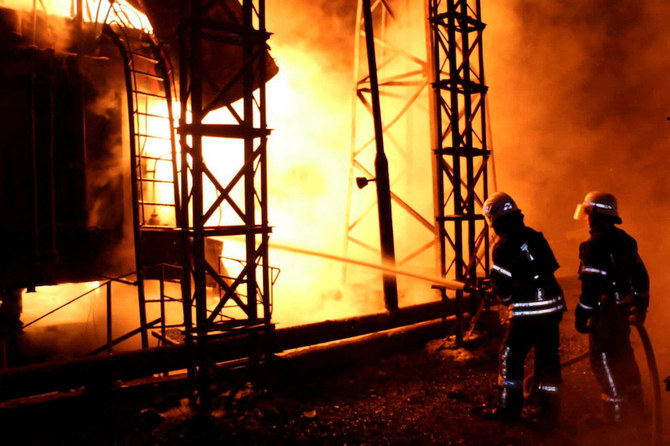
- Kyiv’s action to reclaim Russia-occupied areas in the Kharkiv region forced Moscow to withdraw its troops
- Widespread power outages were reported Sunday night by Ukrainian media
No place to pray for Muslim workers in Italian city

- Urban planning regulations tightly limit the establishment of places of worship, mayor says
- Islam is not among the 13 religions that have official status under Italian law
MONFALCONE, Italy: It’s Friday prayers in the northeastern Italian city of Monfalcone, and hundreds of men are on their knees in a concrete parking lot, their heads bowed to the ground.
They are just a fraction of the city’s Muslims who since November have been banned from praying inside their two cultural centers by Monfalcone’s far-right mayor.
Instead, they assemble in this privately owned construction site as they await a court decision later this month to settle a zoning issue they say has barred their constitutional right to prayer.
Among them is Rejaul Haq, the property’s owner, who expresses frustration over what he and many other Muslims see as harassment by the city they call home.
“Tell me where I should go? Why do I have to go outside of Monfalcone? I live here, I pay taxes here!” lamented Haq, a naturalized Italian citizen who arrived from Bangladesh in 2006.
“Catholics, Orthodox, Protestants, Jehovah’s, if they all have their church — why can’t we have one?”
Immigrants make up a third of this city of 30,000 inhabitants outside Trieste, most of them Bangladeshi Muslims who began arriving in the late 1990s to build cruise-liners for ship builder Fincantieri, whose Monfalcone shipyard is Italy’s largest.
Their presence is immediately visible, whether the Bangladeshi men on bicycles peddling to and from work or the ethnic grocery stores on street corners.
For Mayor Anna Cisint, the restriction on prayer is about zoning, not discrimination.
Urban planning regulations tightly limit the establishment of places of worship, and as a mayor in a secular state, she says it is not her job to provide them.
“As a mayor, I’m not against anybody, I wouldn’t even waste my time being against anybody, you see, but I’m also here to enforce the law,” Cisint said.
Still, she argues the number of Muslim immigrants, boosted by family reunifications and new births, has become “too many for Monfalcone.”
“There are too many... you have to tell it like it is,” she said.
Her warnings about the “social unsustainability” of Monfalcone’s Muslim population have propelled Cisint to national headlines in recent months.
They have also assured her a spot in upcoming European Parliament elections for Matteo Salvini’s anti-immigrant League party, part of Prime Minister Giorgia Meloni’s coalition government.
The League for decades has obstructed mosque openings in its stronghold of northern Italy. But the problem is nationwide in Catholic-majority Italy.
Islam is not among the 13 religions that have official status under Italian law, which complicates efforts to build places of worship.
There are currently fewer than 10 officially recognized mosques, said Yahya Zanolo of the Italian Islamic Religious Community (COREIS), one of the country’s main Muslim associations.
That means that out of Italy’s estimated more than two million Muslims, most are relegated to thousands of makeshift places of worship that “feed prejudice and fear in the non-Muslim population,” said Zanolo.
Cisint, who has been under police protection since receiving online death threats in December, complains about a resistance to integration by what she called a “very closed” community.
She asks why Arabic and not Italian is taught in the community centers and calls “intolerable” wives walking behind husbands or schoolgirls in veils.
In the run-up to European elections, the League has once again seized on illegal immigration to Italy — where nearly 160,000 migrants arrived by boat last year, mostly from Muslim countries — as a vote-winner.
Salvini has called the June vote “a referendum on the future of Europe,” to decide “whether Europe will still exist or whether it will be a Sino-Islamic colony.”
But Monfalcone’s Muslims don’t fit the stereotypes exploited by the League, armed as they are with work permits or passports.
“It’s not like we came here to see the beautiful city of Monfalcone,” jokes Haq. “It’s because there’s work here.”
Many Muslims said they feel a palpable sense of distrust, if not outright hatred, from some of the long-time residents.
Ahmed Raju, 38, who works at Fincantieri installing panels, has mostly prayed at home since the cultural centers have been off-limits.
Such is the reach of the mayor’s rhetoric that “even I get scared” about Muslims, Raju said.
Of the prejudice the community faces, Raju added: “You feel like you’re in front of a big wall, that you can’t break down.”
“We’re foreigners. We can’t change the situation.”
Outside a classroom where volunteers teach Italian to recently immigrated women, Sharmin Islam, 32, said the animosity is acutely felt by her young son who was born in Italy.
“He comes back from school and asks, ‘Mum, are we Muslims bad?’”
An administrative court in Trieste will rule on May 23 whether to uphold or strike down the mayor’s ban on prayer within the cultural centers.
Haq says Monfalcone’s Muslims have “no Plan B” if they lose, but worries even if they win the scars from the stand-off will remain.
Meanwhile Cisint has been actively promoting her book, “Enough Already: Immigration, Islamization, Submission,” warning Monfalcone’s situation could be duplicated elsewhere.
On a recent public holiday, Bangladeshis filled the city’s main square, from little girls with unicorn balloons to groups of young men enjoying a day off.
Looking on was barman Gennaro Pomatico, 24.
“The locals won’t ever accept them,” said Pomatico.
“But ultimately they don’t bother anyone.”
Philippines, US fire at ‘invasion’ force in South China Sea war games
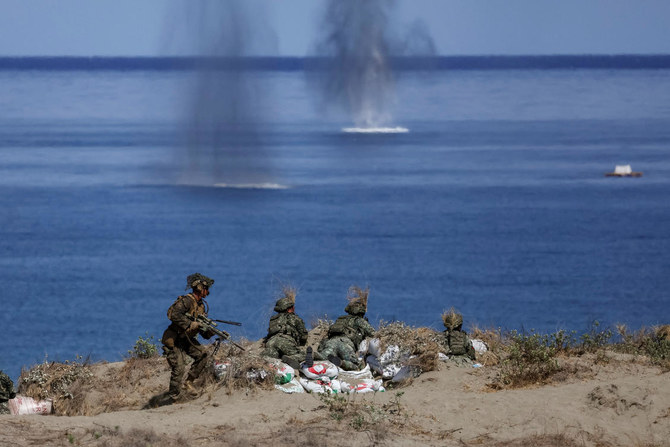
- Thousands of troops are conducting maneuvers against a backdrop of increased confrontations between Chinese and Filipino vessels around shoals in the South China Sea
LAOAG, Philippines: US and Filipino troops fired missiles and artillery at an imaginary “invasion” force during war games on the Philippines’ northern coast Monday, days after their governments objected to China’s “dangerous” actions in regional waters.
Thousands of troops are conducting land, sea and air maneuvers against a backdrop of increased confrontations between Chinese and Filipino vessels around shoals in the South China Sea claimed by Manila, as well as stepped-up Chinese air and naval activity around nearby self-ruled Taiwan.
US troops massed at a strip of sand dunes on Luzon island’s northwest coast — around 400 kilometers south of Taiwan — let loose more than 50 live 155mm howitzer rounds at floating targets about five kilometers off the coast, AFP journalists saw.
Filipino troops followed up by firing rockets aimed at wearing down the attackers, before the two forces finished the job with machine guns, Javelin missiles and more artillery rounds.
Lt. Gen. Michael Cederholm, commander of the US First Marine Expeditionary Force, said the exercise was “to prepare for the worst” by “securing key maritime terrain.”
“It’s designed to repel an invasion,” Cederholm told reporters at the exercise site.
“Our northwestern side is more exposed,” Major General Marvin Licudine, exercise director for the Filipinos, said ahead of the live firing at the La Paz sand dunes near Laoag city.
“Because of the regional problems that we have... we have to already practice and orient ourselves in our own land in these parts,” he added.
Beijing claims almost the entire South China Sea despite an international ruling that its assertion has no legal basis.
It deploys hundreds of coast guard, navy and other vessels to patrol and militarise the waters.
Just last week, Manila said the China Coast Guard damaged a Philippine Coast Guard ship and another government vessel in water cannon attacks around the disputed China-controlled Scarborough Shoal in the South China Sea on April 30.
More than 16,700 Filipino and American troops are taking part in the annual military drills — dubbed Balikatan, or “shoulder to shoulder” in Tagalog — in multiple locations across the Asian archipelago.
Maritime confrontations between China and the Philippines have raised fears of a wider conflict that could involve the United States and other allies.
Monday’s exercise came days after the defense ministers of the Philippines, the United States, Japan and Australia met in Hawaii and issued a joint statement on their strong objections to the “dangerous and destabilising conduct” of China in the South China Sea.
The ministers “discussed opportunities to further advance defense cooperation” and to “work together to support states exercising their rights and freedoms in the South China Sea.”
Last week, US forces taking part in the Balikatan exercises fired HIMARS precision rockets into the South China Sea from the western island of Palawan, the nearest major Philippine landmass to the hotly disputed Spratly Islands.
The US Marine Corps said the maneuver was a rehearsal for the rapid deployment of the missile system across the Philippines’ South China Sea coast to “secure and protect Philippines’ maritime terrain, territorial waters and exclusive economic zone interests.”
The confrontations between the Philippines and China comes as tensions have ratcheted up between Beijing and Taipei, which is about to inaugurate a new president regarded by China as a dangerous separatist.
Taiwan’s defense ministry said Friday it had detected 26 Chinese aircraft and five naval vessels around the self-ruled island in the previous 24 hours.
“To a degree, military exercises are a form of deterrence,” Philippine Foreign Secretary Enrique Manalo was quoted as saying in remarks delivered on his behalf by an aide at a public workshop on Friday.
“The more we simulate, the less we actuate,” he added.
Italy’s pragmatic prime minister leads charge for EU far right
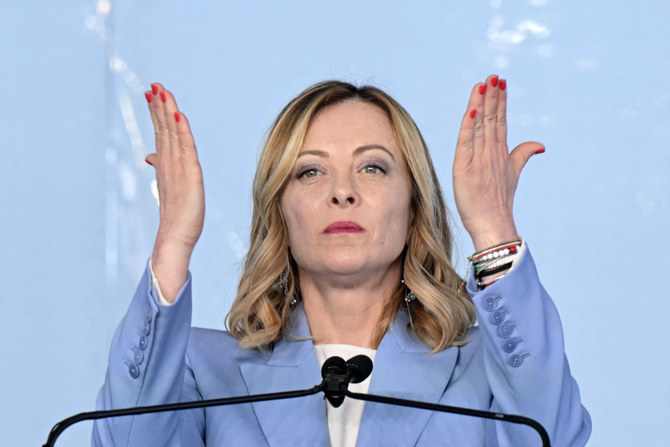
- Her strong support for Ukraine has won her friends in Washington and Brussels, particularly after she helped persuade Hungary’s Viktor Orban to drop his veto of EU aid to Kyiv
- Meloni has also worked closely with European Commission President Ursula von der Leyen, particularly on migration, a priority for the far-right premier
ROME: Having fostered pragmatic relations with Brussels, Italy’s Giorgia Meloni is for many the “moderate” face of Europe’s radical right — and is leading the charge for June elections.
The ascent to power of Meloni’s post-fascist, euroskeptic Brothers of Italy in 2022 sent shockwaves through the European Union, sparking fears of a lurch to the right within a founding member of both the bloc and NATO.
But her strong support for Ukraine has won Meloni friends in Washington and Brussels, particularly after she helped persuade Hungary’s Viktor Orban — a long-time ally sympathetic to Moscow — to drop his veto of EU aid to Kyiv.
Meloni has also worked closely with European Commission President Ursula von der Leyen, particularly on migration, a priority for the far-right premier.
“At a European level, she’s trying to present herself as a sort of moderate conservative and mediator” with the rest of the radical right, noted Lorenzo Castellani, a political analyst at Rome’s LUISS University.
At home, Meloni has pursued a nationalist populist agenda focused on traditional family values, law and order, and migration, including a clampdown on rescue ships operating in the central Mediterranean.
It has raised hackles among the Italian left — particularly moves to exert influence over the RAI public state broadcaster — but nothing yet to spark alarm in Brussels, as with judicial reforms in Hungary and Poland.
Fiscal policy meanwhile has been relatively prudent, reflecting the constraints of being part of the EU’s single currency.
“She wants to be in many aspects the acceptable extreme for the rest of the European political establishment,” Castellani told AFP.
“She’s like the last island before the border.”

“More credible”
Meloni heads the European Conservatives and Reformists (ECR) group in the European Parliament, which includes Spain’s Vox, Poland’s populist Law and Justice (PiS), and France’s Reconquete!.
Marked by a pro-Ukraine, pro-NATO stance, it is viewed as more credible by the Brussels establishment than the other far-right grouping, the euroskeptic Identity and Democracy group (ID).
ID includes Marine Le Pen’s National Rally (RN) in France, Germany’s anti-immigrant AfD and Meloni’s own coalition ally, Matteo Salvini’s far-right League.
Rosa Balfour, director of the Carnegie Europe think tank, says both Rome and Brussels have benefited from a pragmatic working relationship.
“What the Commission has been doing is embrace Meloni and isolate Orban,” who is not part of either grouping, she told AFP.
“And that’s worked very well for Italy because Meloni has managed to extract concessions.”
This has mainly entailed EU support for the premier’s efforts to stop the tens of thousands of migrants who land on Italy’s shores each year on boats from North Africa.
Von der Leyen joined Meloni on the island of Lampedusa last year after a surge in arrivals, and the two women joined EU delegations to Egypt and Tunisia in recent months to agree new deals on energy and migration.
Building bridges
Analysts say the shift to a tougher EU approach on migration was well underway before Meloni arrived — but that has not stopped her claiming credit.
“We want Italy to be central to changing what doesn’t work in Europe,” she said during her election campaign launch last month.
She is standing in the vote — despite an EU rule barring government ministers from taking up their seats — and urged the European right to follow her example.
“We want to do in Europe exactly what we did in Italy on September 25, 2022,” she said.
But Castellani calls this a “bluff.”

“The real game she’s playing is trying to enter within the European game of alliances,” he said, notably building bridges between the ECR and Von der Leyen’s conservative European People’s Party (EPP).
The divisions in the European right are echoed within Meloni’s coalition, notably between her and Salvini — they share similar domestic priorities but differ on foreign affairs.
Salvini’s League has a history of warm ties with Moscow, while he never misses an opportunity to criticize Brussels.
But he has been eclipsed. The League came top in 2019 European elections in Italy with 34 percent, but is now polling closer to eight percent, compared to more than 27 percent for Meloni’s Brothers of Italy.
Fresh face, skilled communicator
Surveys show voters are supportive of Meloni’s foreign policy — and less so of her migration efforts — but Lorenzo Pregliasco, founder of polling company YouTrend, says personality plays a big role.
Meloni is also seen as “more credible” than other Italian leaders, a skilled communicator and a “genuine figure, someone who says what she thinks,” he told AFP.
He notes her 2022 victory was driven by her image as a fresh face, the only party leader who did not join Mario Draghi’s technocratic government.
With the opposition still divided, as they were back then, he predicts she could stay in power for the full five-year term.
But by then the political landscape may be very different, not least if Donald Trump wins the November US presidential election.
Balfour suggests Meloni may have to reposition herself.
If Trump wins, “then you’ve got all the political leaders elbowing each other to lead the right. And Orban has already positioned himself there.”
Chad votes in first Sahel presidential poll since wave of coups
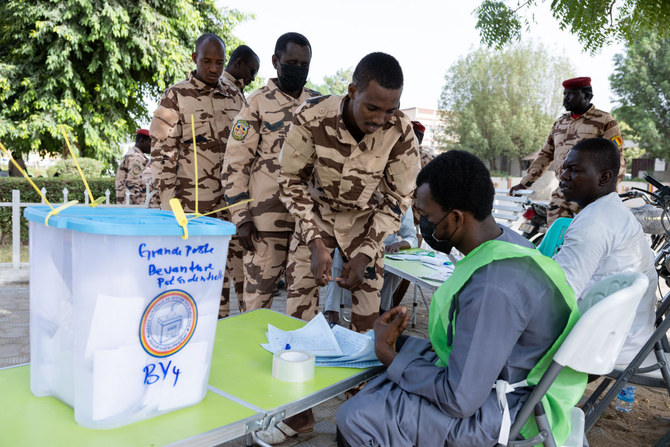
- Monday's vote pits military ruler Mahamat Idriss against his prime minister Succes Masra, previously a political opponent who fled into exile in 2022 but was allowed back a year later
N’DJAMENA: Chadians go to the polls on Monday three years after their military leader seized power, in the first presidential election in Africa’s Sahel region since a wave of coups.
Analysts say Mahamat Idriss Deby, who seized power the day rebels killed his long-ruling father Idriss Deby in April 2021, is most likely to win, although his chief opponent has been drawing larger-than-expected crowds on the campaign trail.
Deby has promised to bolster security, strengthen the rule of law and increase electricity production.
The vote coincides with a temporary withdrawal of US troops from Chad, an important Western ally in a region of West and Central Africa courted by Russia and wracked by jihadism.
Polls open at 7 a.m. and close at 5 p.m., with some 8.5 million people registered to vote.
Soldiers began early voting on Sunday.
Provisional results are expected by May 21 and final results by June 5. If no candidate wins more than 50 percent of the votes, a run-off will be held on June 22.
Since replacing his father at the helm of the oil-producing Central African country, Deby has remained close with former colonial power and longtime ally France.
While other junta-ruled Sahel countries including Mali, Burkina Faso and Niger have told Paris and other Western powers to withdraw and turned to Moscow for support, Chad remains the last Sahel state with a substantial French military presence.
The US, however, announced a temporary withdrawal of at least some troops last month, saying it would continue with a review of security operations after the election.
Opposition concerns
Monday’s vote pits Deby against his prime minister Succes Masra, previously a political opponent who fled into exile in 2022 but was allowed back a year later. Also running are former prime minister Albert Pahimi Padacke and seven other candidates.
Yaya Dillo, an opposition politician who had been expected to run against Deby despite coming from the same clan, was shot and killed in the capital N’Djamena on Feb. 28, the day the election date was announced.
Padacke has accused Masra of collaborating with Deby. But Masra has attracted large crowds to his own rallies.
Some opposition members and civil society groups have called for a boycott, citing concerns about possible vote-rigging.
That has raised fears of potential violence.
“This presidential election is of capital importance for the country because an entire people aspires for change,” said Baniara Yoyana, a former minister and magistrate.
“The process must be conducted with transparency to avoid any risk of confrontation.”
One Deby supporter, however, said he expected no problems.
“We want the election to go well and peacefully,” said Abdelkhader Sougui, a 28-year-old student.
“My wish is to go out and vote the morning of May 6 to confirm our victory... in the first round.”
Exiled Russian historian rallies fellow emigrants in dark times

- Tamara Eidelman is part of a group of exiled anti-war Russian public intellectuals and cultural figures who are rebuilding their careers abroad
- More than 800,000 Russians are estimated to have left the country in just the past two years after Russia invaded Ukraine
WASHINGTON: Russian dissident historian Tamara Eidelman was on vacation in Greece when Moscow’s tanks rolled into Ukraine in February 2022 and she realized that she would not be going back to her home country.
With her single suitcase, Eidelman, 65, flew to Portugal, where her daughter had been living, and began a new life in exile.
“I am operating under the assumption that I will not return. I am building my life in Portugal,” Eidelman, who has over 1.6 million followers on her history channel on YouTube, told AFP. “I want to come back... but if I sit every day thinking ‘When will it finally happen?’ I will go mad.”
Eidelman, who was declared a “foreign agent” by the government in Moscow, is part of a group of exiled anti-war Russian public intellectuals and cultural figures who are rebuilding their careers abroad.
While they cater to a large diaspora — more than 800,000 Russians are estimated to have left the country in just the past two years — unlike the previous waves of emigration from Russia’s calamities, they are able to continue speaking to those who stayed via social media, despite growing government restrictions.
“I think it’s one of the advantages of today’s emigration, if there can be any advantages, that our ties with our homeland have not been ruptured so drastically,” Eidelman, who wore a pin in the colors of the Ukrainian flag on her black blouse, said before a lecture in a community center outside Washington.
“Today there is an opportunity to exchange ideas. And, despite all the bans, inside Russia you can still access what is being done by those who emigrated. It is extremely valuable, it must be used and cherished.”

While exiles are unlikely to have a significant impact on political life inside Russia, “they can be the keepers of ideas, the centers of expertise and civic education,” according to Alexander Morozov, a political analyst and lecturer at Charles University in Prague.
When political change occurs, “Those who have retained trust and their symbolic capital can play a role in Russia’s renewal,” he wrote in a recent paper.
During her first few months in Portugal, Eidelman, who worked as a history teacher at a prestigious Moscow school for more than 30 years before becoming an editor, blogger and public speaker, kept herself busy looking for a place to live, reassembling her YouTube team and signing up for Portuguese lessons.
But she would catch herself thinking she was there on a brief visit and that she needed to buy a bottle of Port wine to bring back to Moscow to her mother and friends. Then it hit her.
“I felt a tremendous weight pressing on me when things had settled down a little and I realized that I am going to be in this wonderful, beautiful country for a long time,” she said. “Of course, (President Vladimir Putin’s) regime will collapse, but I don’t know if I will be around to see it.”
Since the start of Russia’s full-scale invasion, Eidelman’s YouTube channel has ballooned from some 500,000 followers to 1.63 million and a team of 30 people, with lectures on Russian, Ukrainian and world history — as well as a special presentation on Putin’s assault on democracy, which she delivered in a T-shirt that read “No Putin No War.”
“I want to express my unconditional support for Ukraine in this war and I believe that all its territories, including Crimea, must be returned to it,” Eidelman told AFP, referring to the Black Sea peninsula that Russia annexed in 2014.
During her lecture in an auditorium of several hundred Russian speakers titled “The Judgment of History,” Eidelman examined the painful questions of countries’ and societies’ culpability and responsibility for crimes from ancient Greece to Nazi Germany — with the clear undertone of Russia’s war in Ukraine.
Prosecuting those who committed direct crimes against Ukraine will not be enough, Eidelman suggested in her interview with AFP.
“I believe that there cannot be collective responsibility, that a whole people cannot be guilty,” she told AFP. “But at the same time, there must be... moral responsibility, responsibility before one’s conscience.”
Alina, a 39-year-old Russia-born quality control manager drove more than eight hours to Washington from the southern US state of Tennessee with her husband and two children to hear Eidelman speak.
To Alina, Russia’s invasion of Ukraine is “a crime against a neighboring country, but it’s also a crime against my own country because crimes are being committed in the name of people like me, who don’t agree with it.”
In these tragic times, Eidelman’s talk was a breath of fresh air, Alina said.
“When I listen to her lectures, I believe that there is — if not hope, then at least some light ahead for you to follow,” she said. “You get the feeling that you are not alone in all of this, even though physically you live apart from everyone.”
md/bgs/caw




